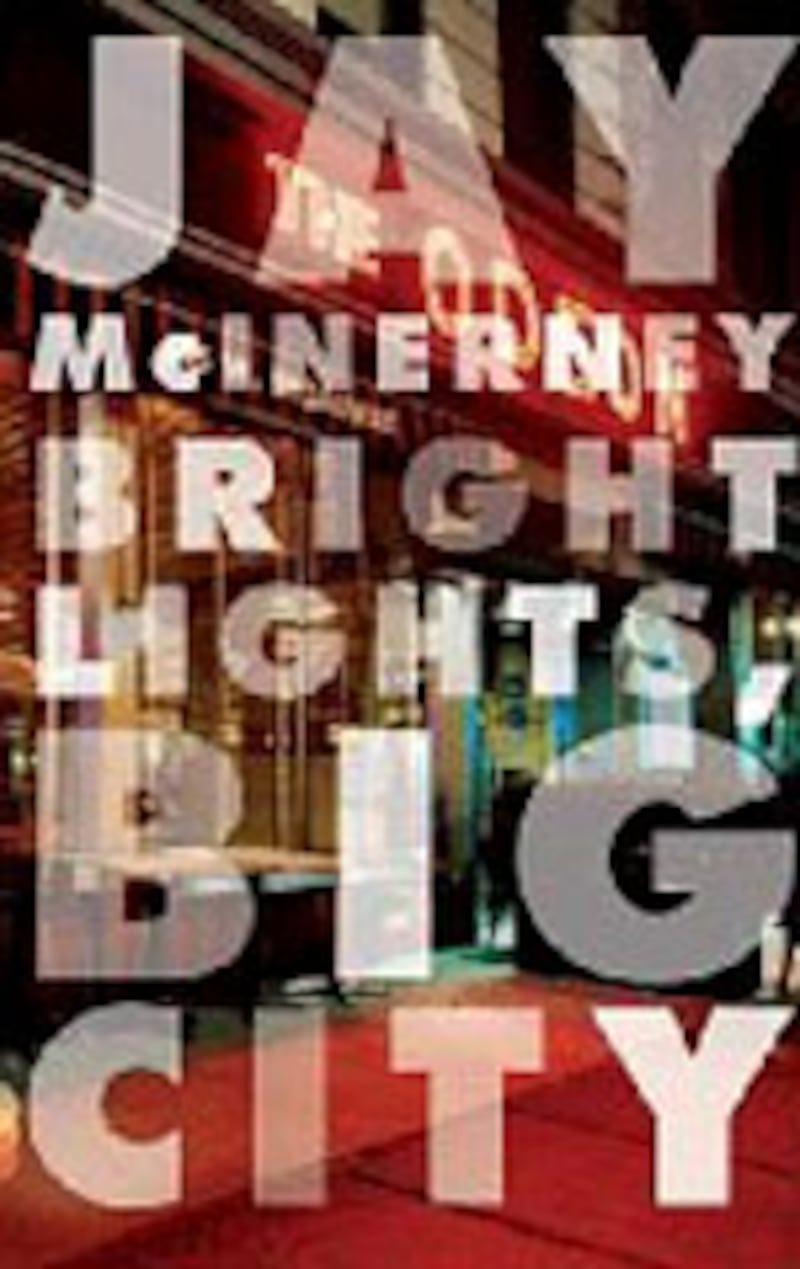
Often this summer in social situations, while acting like myself, I’ve thought to amuse the people around me by observing Manhattan in the early '80s as an analog for the present day. “In both periods we have a charismatic president, huge deficits, the constant threat and chaotic thrill of sudden catastrophe from without,” is a sentence I’ve repeated so often that I must truly believe it. Now I realize that the early '80s is more than a parallel for present day, it is the era of origin for the notably American social scheme presently faltering: management of discontent through lifestyle fetishism built on widely available consumer credit. The Chinese are buying gold, the Treasury’s printing dollars, there is no more cash for clunkers. People are losing their homes, people are on food stamps, people are carrying assault rifles. Amid the charms of apocalypse, Bright Lights, Big City, Jay McInerney’s seminal novel about Manhattan in the early '80s, enters its 25th year of publication and significance as an early observation of Late America’s tendency toward the shattering of the self.
Patrick Bateman may be an anarcho-homicidal maniac, but unlike Carrie Bradshaw he is at least able to keep tabs on his many selves.
Many of the most impactful New York novels of the last quarter-century illustrate through their narratives an escalating crisis of identity. Sex and the City perhaps epitomized this by finding fullest form as a New York television show, premiering on HBO in 1998, the peak of Pax Clintonia. Sarah Jessica Parker played Candace Bushnell who everyone knew to be Carrie Bradshaw who narrated the true telenovela in voiceover like a breath of halothane, characterized by numbness masquerading as sweetness in advance of pain. A massive audience identified with the three parts, one heroine modern woman as scripted by a group of gay men who regarded her regarding herself in the first person, describing the varied material phenomena of bourgeois experience so that the first, second, and third people plural of the agora might lend meaning to her utterly fractured existence by reading about it in the newspaper. But really by watching it on television, where they found and were completely worked over by shiny reflections of their own imagined selves amid the shards of shattered identity. Lost to history is the true series pilot wherein Bradshaw, real name Velda Murkowski, charms her way out of Bellevue. At some point Murkowski breaks from her passage through schizoid spacetime to find that she has no money whatsoever, and, amid so many manic episodes, realizes her multiple and estranged selves have spent it all on shoes.

Go back to 1991 and take Bret Easton Ellis at his word—that the homicides and mutilations of American Psycho may have never happened save for as fantasies in its protagonist’s head—and you must conclude that, as a member of a species whose primary challenge remains basic survival, Ellis’ protagonist is a paragon of adjustment and mental hygiene compared to the mad women of Sex and the City. Patrick Bateman may be an anarcho-homicidal maniac, but unlike Carrie Bradshaw he is at least able to keep tabs on his many selves, knows exactly how many pairs of shoes they’re buying, how much they paid for them, and precisely how they feel when wearing them. Now, if some of Bateman’s selves should happen to fantasize about violently killing almost everyone he comes into contact with, well, as human motivations go that’s far more anthropologically natural and psychologically explainable than Samantha Cattrall foregoing the transmission of her own genetic material for the sake of a few more years of hard flesh, cocktails, and cock. American Psycho explores the intermediary stage in the confusion of self, a psychic space wherein the self may be breaking up, but is doing its best to remain friends who stay in touch. We know that Pat Bateman is not Pat Bateman, and, much to his credit, so does Pat Bateman.
Here I pause to note that all of these works arrived spaced seven years apart, and that this is the biblical length of plagues. And, further, that Jay McInerney’s 1984 publication of Bright Lights allows us excavation to an even earlier level of American self-confusion. The novel’s second-person narrative, which people found so powerfully affecting, cannot be dismissed as but a clever trick when seen in a broader context—as a visceral reaction to the early stage of a society where Don DeLillo’s J. A. K. Gladney tells us in 1985’s White Noise, “I am the false character that follows the name around.” McInerney and DeLillo knew early on what we have learned the hard way, that the Late American Republic of mass individualism is fully the contradiction it seems, less a total answer to human challenges then a psychic Madoff scheme whose false promise—that a better You is just another reinvention away—necessarily obliterates any meaningful or sustainable sense whatsoever of I. That at the center of American life is no longer a green light (Gatsby did get Daisy, for an afternoon) but rather a Mobius strip of hastily printed Obama bills, bubble-gum bound, through which You finds yourself sniffing the world.
At the end of Bright Lights we expect McInerney to bow at the altar of Scott Fitzgerald, to tell us You knows himself but that is all. Except that this doesn’t happen—You lives in a fresh second-person text mirroring a newborn second-person Republic bound for dizzying disasters and disjointments, and in neither setting is any such epiphany possible; when I doesn’t even know itself it can’t possibly realize it doesn’t know anything else, which is precisely what makes the nation’s present situation so precarious. With regards to You, You realizes, You exists on a purely need to know basis and at the end of the novel, You doesn’t need to know.
Bright Lights, Big City continues to move readers because McInerney saw what we all secretly suspected: that amid the orgy of American self I slips away to you, a sensory creature, sated by warm bread, your eyes transfixed by dawn’s rosy fingers, you eagerly awaits the new day and whatever you it brings; “We will have to go slowly,” is all that you can really know, in the end, “We will have to learn everything all over again.”
Plus: Check out Book Beast for more news on hot titles and authors and excerpts from the latest books.
Dana Vachon is a writer living in Manhattan.






